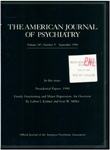Fluphenazine decanoate: a clinical problem?
Abstract
The authors compared the medical records of 20 randomly selected schizophrenic patients who were receiving fluphenazine decanoate with the records of 20 other randomly selected schizophrenic patients who were receiving oral medications only. The fluphenazine decanoate group had a significantly higher mean chlorpromazine equivalent dose (2010 +/- 836) than the oral medication group (373 +/- 384). The two groups did not, however, differ on any of the other variables studied. The findings, in addition to reports in the literature, suggest that the use of fluphenazine decanoate may come at the inadvertent cost of a significantly higher dose of antipsychotic medications in a subgroup of patients.
Access content
To read the fulltext, please use one of the options below to sign in or purchase access.- Personal login
- Institutional Login
- Sign in via OpenAthens
- Register for access
-
Please login/register if you wish to pair your device and check access availability.
Not a subscriber?
PsychiatryOnline subscription options offer access to the DSM-5 library, books, journals, CME, and patient resources. This all-in-one virtual library provides psychiatrists and mental health professionals with key resources for diagnosis, treatment, research, and professional development.
Need more help? PsychiatryOnline Customer Service may be reached by emailing [email protected] or by calling 800-368-5777 (in the U.S.) or 703-907-7322 (outside the U.S.).



